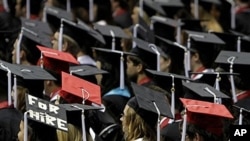For many people, attending college is part of the American dream, a gateway to success and a good job. But, as many recent college graduates are learning the hard way, dreams don't always become reality.
It didn't take a diploma for twenty-year-old Dale Stephens to figure that out. Disillusioned with college because he felt he was not getting the skills he wanted, he dropped out and started "UnCollege," a social movement that challenges the notion that college is the best path to success.
Home-schooled for much of his youth, Stephens knows what it’s like to learn outside the classroom. His movement isn't opposed to higher education, he says, but focused on alternatives for those who feel pressured to enroll.
"I’m suggesting that everyone take a good, hard look at their education, figure out why they are there and what they’re doing with it, so that people can decide whether or not it makes sense to stay in college or leave school," he says.
He also points out that many college graduates have student loans that take years to repay. The Federal Reserve Bank of New York estimates that outstanding student loans skyrocketed to more than $800 billion last year, $1 billion more than all U.S. credit card debt combined.
Stephens urges people to consider using money they would have spent for college on other learning experiences.
"What if you took that money and instead invested in a year of traveling. What if you invested in a start-up or started a non-profit and were able to gain some of those same learning experiences in ways that you would never be able to inside the classroom."
A tangible skill set
"I left school because there wasn’t a program for what I wanted to do right now," says Ben Goering, who dropped out of college two years ago and now works for a social-media website in San Francisco.
"Ultimately, I'd been following the industry and been a computer nerd and been on the web for my entire life," he says. "The initial catalyst was definitely, I think, having a very tangible skill set to leave college with and then quickly get hired with."
Stories like Goering's concern Dan Hurley of the American Association of State Colleges and Universities, who calls the UnCollege movement "misleading and dangerous."
"Post-secondary credentials are at their highest demand that they have even been," he says. "If today’s youth has any hope of achieving an American middle-class lifestyle, the odds are very high that they’re going to have to have some type of post-secondary credential, likely a two-year degree, if not a four-year degree or higher."
No guarantees
But Stephens says a college degree is no longer a guarantee of a higher income.
“For the recent class of graduates there’s a pretty harsh reality. Twenty-two-and-a-half percent of those under 25 with college degrees are unemployed," he says. "Another 22 percent of those with degrees are working jobs that don’t require their degree.”
Despite the dismal job market, Marc Kramer has no regrets and says he values his college experience.
"College is one of the best things that has ever happened to me," says Kramer. "I don’t think any topic, in particular, is pointless, because every topic you take helps you expand your knowledge through a different way of thinking that you normally wouldn’t have."
Michael Brunwesser, who plans to graduate from college soon, admits that he has thought about leaving.
"There are so many books and so much information on the Internet specifically targeted at skills or subjects that I would like to learn, so the UnCollege movement isn’t some far-fetched idea of a kid who just wants to be a bum on his parents’ couch," he says. "It’s a valuable philosophy."
To further promote that philosophy, Stephens received a $100,000, two-year grant from the Thiel Foundation, which encourages lifelong learning, and a book he's writing about UnCollege is expected to be published next year.
News
Dropouts 'UnCollege' Path to Success




